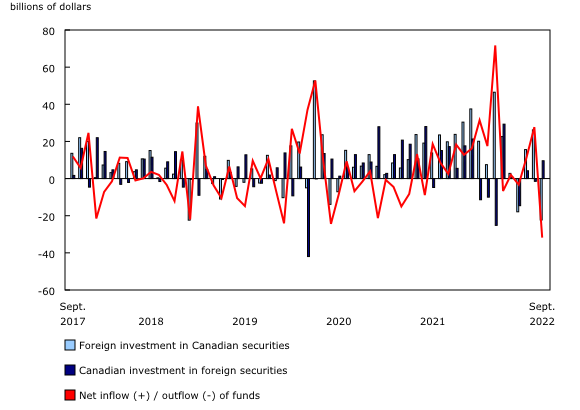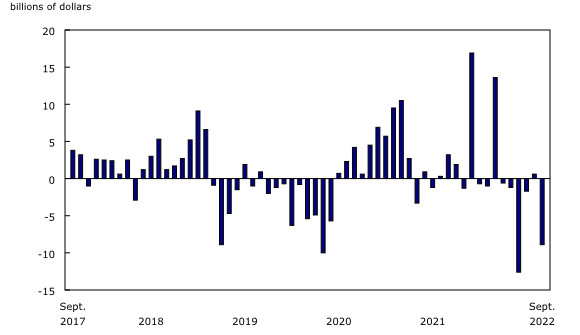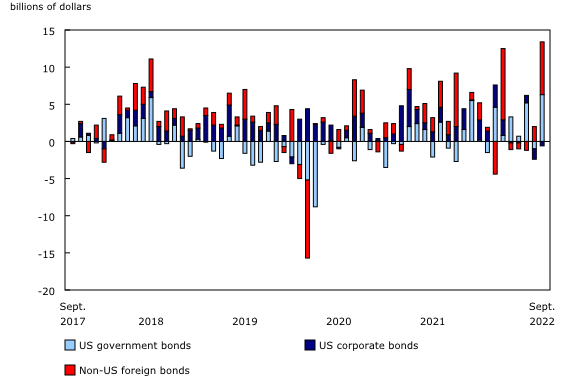Canada's international transactions in securities, September 2022
Archived Content
Information identified as archived is provided for reference, research or recordkeeping purposes. It is not subject to the Government of Canada Web Standards and has not been altered or updated since it was archived. Please "contact us" to request a format other than those available.
Released: 2022-11-18
Non-resident investors reduced their exposure to Canadian securities by $22.3 billion in September, mainly in the form of federal government debt securities and Canadian shares. Meanwhile, Canadian investors acquired $9.6 billion of foreign securities, led by an unprecedented investment in foreign bonds.
As a result, international transactions in securities generated a net outflow of funds of $31.8 billion from the Canadian economy in September, the largest outflow since December 2000. Overall, international transactions in securities generated an inflow of funds of $7.3 billion for the third quarter of 2022 and of $119.9 billion from January to September 2022.
Largest foreign divestment in Canadian securities since December 2018
Foreign divestment in Canadian securities totalled $22.3 billion in September, the largest divestment since December 2018. This activity followed two months of strong foreign investment, totalling $41.8 billion. Foreign divestment in September focused on federal government debt securities and chartered bank securities.
Non-resident investors reduced their exposure to Canadian federal government debt securities by an unprecedented $15.0 billion in September, mainly due to retirements. More specifically, foreign holdings of federal paper were down by a record $9.2 billion, targeting both Canadian and US dollar denominated instruments. Meanwhile, foreign acquisitions of Canadian corporate debt securities slowed to $3.2 billion, the lowest investment since July 2021. The slowdown mainly reflected a reduction in net issuance activities abroad by Canadian chartered banks.
In September, the Bank of Canada raised its policy rate for a fifth time in 2022. Canadian short-term interest rates rose to their highest levels since December 2007, while long-term interest rates edged down.
Foreign investors also reduced their holdings of Canadian equities by $8.9 billion in September. The bulk of the divestment was in shares of the banking sector, as non-resident investors sold $7.7 billion worth in September after purchasing $4.8 billion in August. Canadian share prices, as measured by the Standard and Poor's/Toronto Stock Exchange composite index, were down by 4.6% in September.
Canadian investment in foreign bonds reaches a record high
Canadian investors acquired $9.6 billion of foreign securities in September, the largest investment since April. The activity in September was led by purchases of foreign government bonds.
Canadian investment in foreign bonds amounted to a record $12.9 billion in September. Investors acquired $7.1 billion of non-US foreign bonds, mainly government securities. In addition, they purchased $6.3 billion of US government bonds, the largest investment since November 2015. In September 2022, US long-term interest rates exceeded Canadian long-term interest rates by the largest value since January 2020.
Meanwhile, Canadian investors reduced their holdings of foreign equities by $1.4 billion, a fifth consecutive monthly divestment. US stock prices, as measured by the Standard and Poor's/Toronto Stock Exchange composite index, fell by 9.3% in September.
Note to readers
The data series on international transactions in securities covers portfolio transactions in equity and investment fund shares, bonds, and money market instruments for both Canadian and foreign issues. This activity excludes transactions in equity and debt instruments between affiliated enterprises. These are classified as foreign direct investment in international accounts.
Equity and investment fund shares include common and preferred equities, as well as units or shares of investment funds. For the sake of brevity, the terms "shares" and "equity and investment fund shares" have the same meaning.
Debt securities include bonds and money market instruments.
Bonds have an original term to maturity of more than one year.
Money market instruments have an original term to maturity of one year or less.
Government of Canada paper includes Treasury bills and US-dollar Canada bills.
All values in this release are net transactions unless otherwise stated.
Next release
Data on Canada's international transactions in securities for October will be released on December 16.
Products
The Canada and the World Statistics Hub (13-609-X) is available online. This product illustrates the nature and extent of Canada's economic and financial relationship with the world using interactive graphs and tables. This product provides easy access to information on trade, investment, employment and travel between Canada and a number of countries, including the United States, the United Kingdom, Mexico, China, and Japan.
As a complement to this release, the data visualization product "Securities statistics," part of the series Statistics Canada – Data Visualization Products (71-607-X), is available online.
The User Guide: Canadian System of Macroeconomic Accounts (13-606-G) is also available.
The Methodological Guide: Canadian System of Macroeconomic Accounts (13-607-X) is available.
Contact information
For more information, or to enquire about the concepts, methods or data quality of this release, contact us (toll-free 1-800-263-1136; 514-283-8300; infostats@statcan.gc.ca) or Media Relations (statcan.mediahotline-ligneinfomedias.statcan@statcan.gc.ca).
- Date modified:





